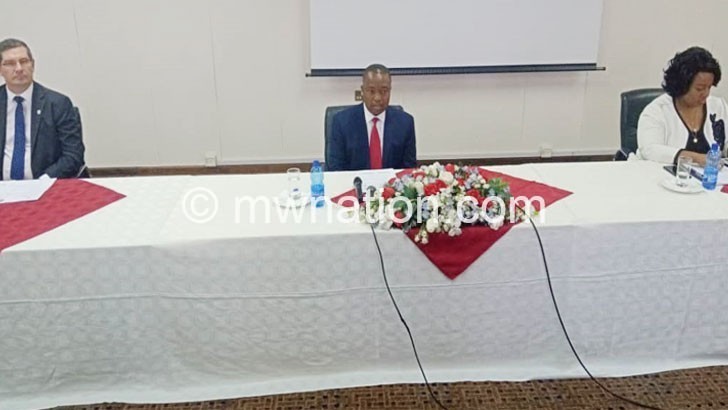RBM defends k57bn profit
Reserve Bank of Malawi (RBM) Governor Dalitso Kabambe has justified the need for the central bank to be in robust financial position, saying the bank does not want to seek recapitalisation from government.
The govenor was quizzed to explain the central bank’s supernormal profit of K57 billion registered in 2019 which is tripple the K19.4 billion profit made in the preceding year.
RBM’s annual financial statement, released a week ago, also shows that the bank’s total comprehensive income increased to K125 billion in the year under review, from K47.4 billion in 2018.

Kabambe (C ) flanked by Bankers Association of Malawi second vice-president Zandile Shaba and Standard Bank Malawi plc chief executive officer William le Roux during the briefing
Kabambe made the justification on Friday in Lilongwe at a news conference on measures to mitigate the impact of coronavirus (Covid-19) disease on the banking industry.
He said: “Obviously, you don’t want your central bank to make losses because in the
case, we will have to go to government to ask for a bailout.
“We do not want a situation where we want recapitalisation. We want the bank to be self-sustaining.”
RBM, which holds liabilities for the State, is by law required to place 10 percent of government liabilities into the General Reserve Fund as guided by Section 64 Sub-Section 2 of the amended RBM Act of 2019.
Besides, Section 64 sub-Section 3 of the same legislation entails that the bank’s profit shall be credited to the General Reserve Fund until it reaches 10 percent of the amount of the bank’s monetary liabilities and thereafter, any profit shall be distributed to government in form of dividends.
Business News also understands that in the event of a loss incurred by the bank, such a loss is deducted from the same General Reserve Fund.
Kabambe, therefore, disclosed that in line with the law, RBM has already placed about K16 billion into the General Reserve Fund while also appropriating another package in the range of about K17 billion to Treasury in form of dividends.
The central bank’s financial buoyancy also comes at a time when Malawi’s commercial banks have been praised for being adequately capitalised, liquid, sound and profitable, and in stable condition.
According to a recent publication by the World Bank Malawi office, the Malawi Economic Monitor, a June 2019 stress test showed that overall, the banking system is resilient to interest rate and income risk shocks but vulnerable to some credit and liquidity risk shocks.





